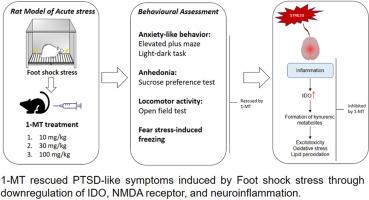1-甲基-d -色氨酸(1-MT)抑制吲哚胺2,3-双加氧酶通过下调神经炎症和NMDA受体来拯救ptsd样症状。
IF 4.7
3区 医学
Q1 PHARMACOLOGY & PHARMACY
引用次数: 0
摘要
创伤后应激障碍(PTSD)是一种因暴露于创伤性事件而导致的使人衰弱的精神健康状况。目前PTSD的治疗仅限于选择性5 -羟色胺再摄取抑制剂,这通常与严重的副作用相关,导致治疗依从性差,效果有限。最近的研究表明,吲哚胺2,3-双加氧酶(IDO)可能在应激相关疾病的发展中起重要作用。因此,靶向和抑制IDO可能为治疗创伤后应激障碍等疾病提供一种有希望的新方法。因此,1-甲基- d -色氨酸(1-MT),一种IDO抑制剂,在表现ptsd样症状的大鼠身上进行了测试。采用足部休克应激法(FSS)模拟创伤经历,建立创伤后应激障碍大鼠模型。在诱发PTSD后,通过进行一系列测试来评估1-MT的潜在益处,包括蔗糖偏好、冷冻行为、明暗转换和野外测试。此外,利用生化评价、ELISA、免疫印迹和免疫组织化学研究1-MT的药理作用。通过改善行为参数、皮质醇水平和氧化应激标志物,特别是谷胱甘肽和丙二醛,1-MT显著减轻了PTSD症状。1-MT可有效抑制海马和pfc中IDO、TNF-α和NF-κB磷酸化水平的表达,通过抑制IDO和减轻神经炎症,进一步减轻n -甲基- d -天冬氨酸(NMDA)受体亚基NR1的过表达。总体结果强烈提示1-MT可通过缓解TNF-α/NF-κB/IDO信号通路作为治疗PTSD的潜在药物。本文章由计算机程序翻译,如有差异,请以英文原文为准。

Inhibition of indoleamine 2,3-dioxygenase by 1-methyl-D-tryptophan (1-MT) rescued PTSD-like symptoms via downregulation of neuroinflammation and NMDA receptor
Post-traumatic stress disorder (PTSD) is a debilitating mental health condition stemming from exposure to traumatic events. Current treatment for PTSD is limited to the selective serotonin reuptake inhibitors, which are often associated with severe side effects and result in poor treatment adherence and limited effectiveness. Recent studies indicate that indoleamine 2,3-dioxygenase (IDO) may play a significant role in the development of stress-related disorders. As a result, targeting and inhibiting IDO could offer a promising new approach for treating conditions like PTSD. Therefore, 1-Methyl-D-tryptophan (1-MT), an IDO inhibitor, was tested in rats exhibiting PTSD-like symptoms. The rat model for PTSD was created using foot shock stress (FSS) as a method to simulate traumatic experiences. Following the induction of PTSD, the potential benefits of 1-MT were assessed by performing a series of tests, including sucrose preference, freezing behaviour, light-dark transition, and open field tests. Additionally, biochemical evaluation, ELISA, western blotting, and immunohistochemistry were utilized to investigate the pharmacological effects of 1-MT. 1-MT significantly reduced PTSD symptoms, as shown by improvements in behavioural parameters, cortisol levels, and oxidative stress markers, specifically GSH and MDA. 1-MT effectively treated the expression levels of IDO, TNF-α, and the phosphorylation of NF-κB in both the hippocampus and the PFC. By inhibiting IDO and reducing neuroinflammation, it further lessened the overexpression of N-Methyl-D-Aspartate (NMDA) receptor subunit NR1. Overall findings strongly suggest that 1-MT could serve as a potential therapeutic agent to treat PTSD by alleviating the TNF-α/NF-κB/IDO signaling pathway.
求助全文
通过发布文献求助,成功后即可免费获取论文全文。
去求助
来源期刊
CiteScore
9.00
自引率
0.00%
发文量
572
审稿时长
34 days
期刊介绍:
The European Journal of Pharmacology publishes research papers covering all aspects of experimental pharmacology with focus on the mechanism of action of structurally identified compounds affecting biological systems.
The scope includes:
Behavioural pharmacology
Neuropharmacology and analgesia
Cardiovascular pharmacology
Pulmonary, gastrointestinal and urogenital pharmacology
Endocrine pharmacology
Immunopharmacology and inflammation
Molecular and cellular pharmacology
Regenerative pharmacology
Biologicals and biotherapeutics
Translational pharmacology
Nutriceutical pharmacology.

 求助内容:
求助内容: 应助结果提醒方式:
应助结果提醒方式:


